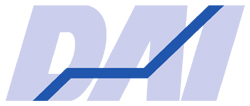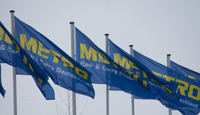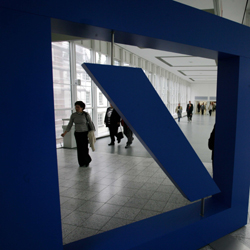Campus
Only one in eight still holds shares
 As the latest study by the German Share Institute (DAI) proves, more and more Germans are getting skeptical about securities. In the second half of 2010 the number of shareholders has again dropped significantly. Compared to the maximum level ten years ago, it declined by 36.4 percent to 8.2 million, accounting for 12.6 percent of the population. 3.4 million investors, representing 5.3 percent of the population, were directly invested in shares. Of the direct shareholders 604,000 are purely employee shareholders.
As the latest study by the German Share Institute (DAI) proves, more and more Germans are getting skeptical about securities. In the second half of 2010 the number of shareholders has again dropped significantly. Compared to the maximum level ten years ago, it declined by 36.4 percent to 8.2 million, accounting for 12.6 percent of the population. 3.4 million investors, representing 5.3 percent of the population, were directly invested in shares. Of the direct shareholders 604,000 are purely employee shareholders.
DIRK without Bommer
Kay Bommer has resigned at his own request as CEO of the German Investor Relations Association (DIRK) after nine years, in order to take up new professional challenges. Peter List was appointed provisional successor.
Metro tops for Annual Report
 Once again this year, the Econ-Verlag in cooperation with Handelsblatt honoured firms for their financial communications in the categories of financial and sustainability reporting, image publishing and film, website, magazine, PR activities and strategic corporate communications, as well as the new discipline of social media. Of the numerous entries in the annual-report category, Metro AG was awarded platinum, the Austrian Wienerberger AG gold, Henkel AG & Co. KGaA silver and BMW AG bronze. Bertelsmann received a Special Award for its annual report. Bayer was awarded a bronze medal for its online annual report. Here, the chemical company is the most successful company in terms of corporate communication: the Leverkuseners reaped a total of three awards.
Once again this year, the Econ-Verlag in cooperation with Handelsblatt honoured firms for their financial communications in the categories of financial and sustainability reporting, image publishing and film, website, magazine, PR activities and strategic corporate communications, as well as the new discipline of social media. Of the numerous entries in the annual-report category, Metro AG was awarded platinum, the Austrian Wienerberger AG gold, Henkel AG & Co. KGaA silver and BMW AG bronze. Bertelsmann received a Special Award for its annual report. Bayer was awarded a bronze medal for its online annual report. Here, the chemical company is the most successful company in terms of corporate communication: the Leverkuseners reaped a total of three awards.
Firms outsource annual reports
The IR and PR consultancy cometis AG has asked many listed companies about their use in the past year of outsourcing services in the preparation of annual reports. Almost every second company stated here that its annual report is created by an IR agency. The most frequently cited reasons for this: know-how, freeing up staff, quality and time saving. The decisive points for the selection of an IR agency are its costs, references, the team and their understanding of investors’ requirements. Service providers take over mostly the design or the graphic creation, editing, and the drafting of the texts for the image section. Only 40 percent have the situation report also done outside. Basically, the language-intensive work (such as the letter from the Board) or know-how-intensive parts (such as the market part) are more often created by an agency. Overall, concludes cometis, external partners are indispensable for the creation of financial reports. On the one hand, they have their own graphics departments and thus higher manpower. Second, they usually look after several companies and have gained deep technical know-how.
In addition to the cometis study, geschäftsberichte-portal asked companies about the use of online content management systems in the preparation of annual reports. One in two said they did not use such a system. However, about three-quarters of respondents plan to deploy such a system in the future. In many cases the system is provided by an IR service. The majority see the advantage of the systems in the consolidation of layout and content. The user experience is also a crucial selection criterion.
Online IR increasingly important
New social media, or new formats such as HTML online annual reports, are lastingly changing the dialogue between IR departments and investors, according to a study by the German Share Institute (DAI) and the consulting firm NetFederation. Thus, the majority of respondents feel the importance of online IR will continue to rise. The homepage has long been one of the most important information sources for potential investors when taking investment decisions. One of the most widespread of the innovative instruments is the digital business report in HTML format with improved viewing and navigation. The approach to online shareholder meetings is, however, inconsistent. True, the majority of DAX companies already have these or at least plan to, but some of the concerns are hesitant towards the new ways. Many companies are also wary of using Web 2.0 applications. The majority of firms are not yet planning to use Facebook, Twitter, YouTube or blogs for IR purposes. The greatest obstacle seen here is that such formats tie up resources, and postings have to be constantly fed with current information.
 Deutsche Bank system-relevant
Deutsche Bank system-relevant
The Japanese newspaper Mainichi Shimbun in late December 2010 published a Japanese Securities and Exchange list of the 60 most system-relevant banks worldwide. Number one, finishing ahead of the U.S. banks Goldman Sachs and JP Morgan, was the Deutsche Bank.















